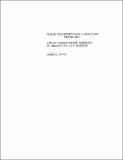Airline market share modeling in originating city markets
Author(s)
Davis, James E.
DownloadFTL_R_1989_05.pdf (4.228Mb)
Other Contributors
Massachusetts Institute of Technology. Flight Transportation Laboratory
Metadata
Show full item recordAbstract
The Airline Deregulation Act of 1978 has not only affected the way airlines compete with each other, it has also changed the distribution channels that were once rigidly controlled by the airlines, travel agents and Civil Aeronautics Board. In recent years, the cost to airlines of having travel agents distribute their tickets has increased significantly. Since a large portion of these costs stems from airlines paying "overrides" to travel agents who exceed a baseline market share, which has been set by airline management, the determination of a carrier's market share in an originating city market can have serious profit implications. The problem addressed in this thesis is how an airline might predict its share of the passenger market out of an originating city. In this thesis, six different mathematical models, relating a carrier's market share to a set of exogenous variables, are proposed. Using actual airline market share data, each of these models is calibrated and tested in fifteen selected test markets and a statistical determination of each model's accuracy is performed. Of the six models tested, a non-linear multivariable regression model, relating a carrier's market share to its: seat share; frequency share; proportion of non-stop flights; and proportion of total destinations served, out of an originating city, is preferred. The use of this market share model should help airlines predict their share of the originating city passenger market, and thus, provide them with a means of setting market share quotas based upon a known set of service variables.
Description
August 1989 Also issued as an M.S. thesis Massachusetts Institute of Technology, Dept. of Aeronautics and Astronautics, 1989 Includes bibliographical references (p. 129-130)
Date issued
1989Publisher
Cambridge, Mass. : MIT, Dept. of Aeronautics and Astronautics, Flight Transportation Laboratory, [1989]
Other identifiers
20484817
Series/Report no.
FTL report (Massachusetts Institute of Technology. Flight Transportation Laboratory) ; R89-5
Keywords
Airlines, Market share, Management, Mathematical models, Finance